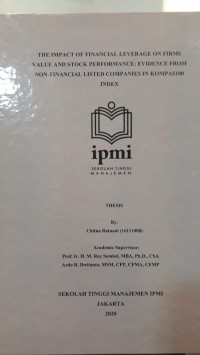
The Impact of Financial Leverage on Firms Value and Stock Performance: Evidence from Non-Financial Listed Companies in Kompas100 index
| Gmd : Text
| Availability :
| 2020CS184 | CS/184 | IPMI Kalibata (Thesis S1) | Available |
Firms require capital to operate their daily activities and achieve their objectives, which in most cases, the goal of the firm is maximize value. Firms can raise capital through debt or equity and the company will try to get a combination of debts and equities which will maximize the value of the firm. Previous studies have tried to uncover the positive or negative impact of Financial Leverage on Firm’s Value and Stock Performance, so this research study fills the gap as this study aims to identify the possibility of a non-linear relationship between financial leverage and firm’s value and stock performance based on the listed companies in Kompas100 as the evidence, during the observation period of 2014-2018. This study aims to prove that Leverage has a non-linear relationship with Firm’s value and Stock Performance.
This study uses quantitative research and the data is derived from secondary data, that is the annual reports and financial statements of the listed companies. For the measurement of variables, this study uses Debt-Equity Ratio (Model 1) and Debt-Asset Ratio (Model 2) as an independent variable to measure Financial Leverage. Tobin’s Q, Enterprise Value/EBITDA, and Earnings Yield are used to measure Firm’s Value. Whereas, Stock Return, Stock Risk and Beta are used to measure Stock Performance. For the data analysis, this study uses Panel Data Regression, Multicollinearity test, the Individual Parameter Significance Testing (T-Test) and Simultaneous Significance Testing (F-Test).
Based on the results of this research, this study found that Debt Asset Ratio is the only variable that has a significant non-linear relationship with Tobin’s Q (Firm’s Value), during the period of 2014-2018. Hence, supporting the second hypothesis of this study and it aligns with the findings and assumptions of the Trade-off Theory. For recommendations, it is encouraged that future observations consider companies that pay based on final tax by adding a dummy variable when running the regression. It is also encouraged that further research to use different variables to measure Firm’s value such as Economic Value Added or Market Value Added.
Keywords: Financial Leverage, Firms Value, Stock Performance, Non-linear Relationship
| Series Title |
-
|
|---|---|
| Call Number |
CS/184
|
| Publisher Place | Jakarta |
| Collation |
xi, 125p; 30cm
|
| Language |
English
|
| ISBN/ISSN |
-
|
| Classification |
CS/184
|
| Media Type |
-
|
|---|---|
| Carrier Type |
-
|
| Edition |
-
|
| Subject(s) | |
| Specific Info |
-
|
| Statement |
-
|
| Content Type |
-
|
No other version available







